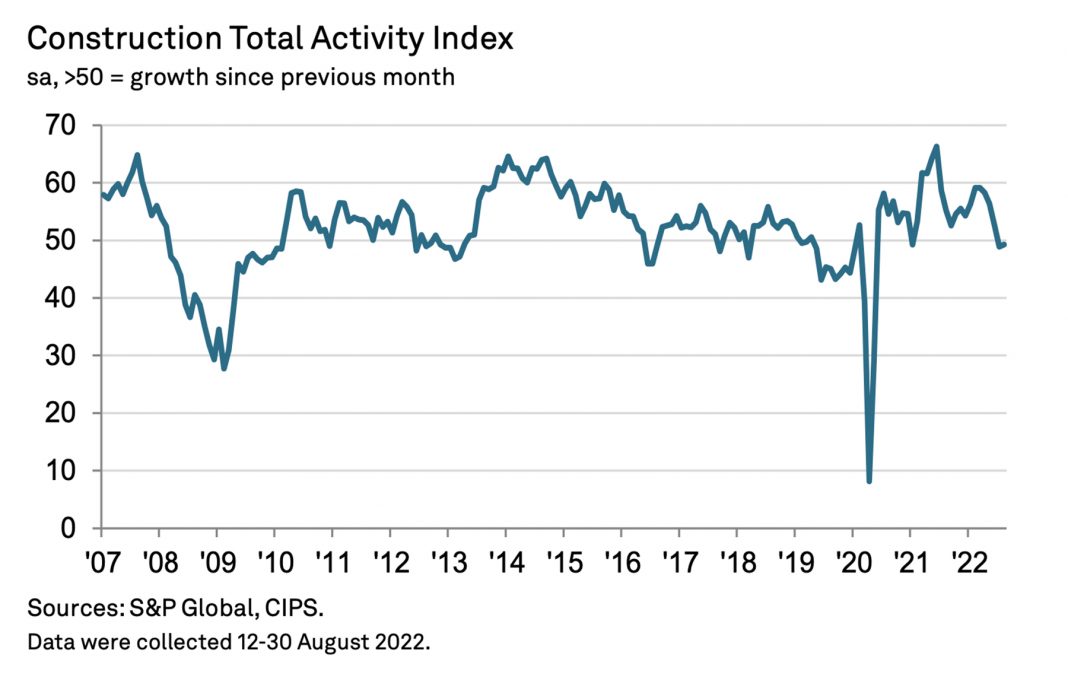Construction activity in the UK dipped for the second successive month in August as customer demand moved closer to stagnation amid cost pressures and economic uncertainty, according to the latest PMI report from S&P Global / CIPS UK.
“Concerns about wider economic prospects led to a drop in business confidence and slower job creation, while firms’ purchasing activity declined. Falling buying activity did alleviate some pressure on supply chains, with lead times lengthening to the least extent in two-and-a-half years, while inflationary pressures also showed signs of waning.
“On a more positive note,” the report continues, “activity on housing projects increased for the first time in three months, albeit fractionally. While some firms increased activity in response to ongoing growth of new orders, this was outweighed by those constructors that saw output decline as firms adjusted to signs of demand weakening.
“New orders increased only marginally in August, and to the least extent since June 2020. Some respondents indicated that customers were holding back on committing to new orders amid cost pressures. Alongside inflationary pressures, concerns around the potential for a wider economic downturn also impacted the sector in August.
“Business confidence dropped in July and was well below the series average. In some cases, concerns around the wider economic environment impacted hiring decisions. Although rising new orders, the clearing of backlogged work and the filling of previously vacant positions kept employment rising solidly, the rate of job creation eased to the softest since March 2021. Construction firms scaled back their input buying for the first time since the initial wave of the Covid-19 pandemic, again reflecting signs of a slowdown.
“There were also some reports that less pronounced price and supply pressures reduced the need to build inventories. In fact, the reduction in pressure on suppliers meant that vendor lead times lengthened to the least extent for two-and-a-half years in August. Where delivery times did lengthen, panellists attributed this to shortages of certain materials. In line with the picture for supply-chains, there were also signs of inflationary pressures moderating midway through the third quarter. Input costs continued to increase sharply, often due to higher fuel prices, but the rate of inflation softened to the weakest since February 2021. Similarly, the pace of increase in sub-contractor rates also softened, and was the slowest in 16 months. As well as scaling back purchasing and slowing the rate of job creation, construction firms kept their usage of subcontractors unchanged in August. This ended an 18-month sequence of expansion. Meanwhile, the rate of subcontractor availability continued to fall sharply, and to the largest degree in six months.
Andrew Harker, Economics Director at S&P Global Market Intelligence, which compiles the survey said: “The UK construction sector looks set to be in for a challenging period, according to the latest PMI data. Not only did construction activity fall for the second month running, but a range of indicators from the survey pointed to further weakness ahead. New orders slowed to a crawl, while concerns about the sector and the wider economy led to a drop in confidence. “Activity weakness was broad-based in August, with none of the three monitored categories immune to the wider slowdown. Commercial activity dropped into contraction for the first time in just over a year-and-a-half, and while housing activity ticked higher, the segment has been in broad stagnation over the past three months.
“Price and supply pressures showed further signs of easing as waning demand throughout the sector lifted pressure on suppliers. Meanwhile, the main positive from the latest survey was a solid increase in employment. That said, hiring at least in part reflects an ongoing catch-up following the pandemic. If activity continues to fall, firms will likely soon feel that their staffing capacity is sufficient and pause hiring.”
Dr John Glen, Chief Economist at the Chartered Institute of Procurement & Supply, said: “The UK construction sector is poised for contraction once again as rising prices for raw materials worldwide filtered into UK supply chains. Just 14 months since the sector’s recent peak as part of the recovery from the pandemic, inflation is seeing housing and commercial building stagnate with civil engineering activity dropping significantly.
“There is some consolation for the sector as it readies itself for a future of high energy costs, however. Lower demand is leading to fewer purchases, downward pressure on input costs and more responsive supply chains. Together, these trends could eventually help to reverse inflation, but a prolonged dip in new orders will be a bitter pill for the sector to swallow.”












